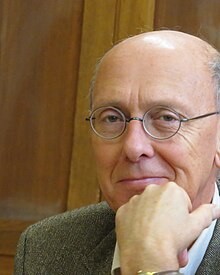Jonathan Dancy
| Jonathan Dancy | |
|---|---|
 |
|
| Born | 8 May 1946 |
| Era | Contemporary philosophy |
| Region | Western philosophy |
|
Main interests
|
Moral theory |
|
Notable ideas
|
Moral particularism |
|
Influences
|
|
|
Influenced
|
|
Jonathan Peter Dancy (born 8 May 1946) is a British philosopher, who has written on ethics and epistemology. He is currently Professor of Philosophy at University of Texas at Austin and Research Professor at the University of Reading. He taught previously for many years at the University of Keele.
Dancy was educated at Winchester College, where he was Head Boy and played cricket for the school, and Corpus Christi College, Oxford, where he obtained a double first in classics (1965-7:Classical Honour Moderations: First Class Honours; 1967-9: Literae Humaniores: First Class Honours, BA).
After graduating he served as a lecturer at Pembroke College, Oxford for a year. In 1971 he became a lecturer at Keele University, becoming professor there in 1991.
After being mentioned by his daughter-in-law, American actress Claire Danes, during an appearance on The Late Late Show with Craig Ferguson, Dancy appeared as a guest on the program on 1 April 2010.
He was elected a Fellow of the British Academy in 2016.
After having worked on problems of epistemology, and more particularly on the nature of perception (argument from illusion), he emerged as the leading proponent in ethics of moral particularism, the idea that all moral reasons are particular and context-sensitive, rather than general. He also defends what he calls the holism of reasons, namely the idea that a consideration that is a reason for acting in a certain way in one case may not be a reason for acting in that way, or even a reason for not acting in that way, in other cases. In this sense, reasons are context-dependent. Dancy argues that the holism of reasons provides a major support for the main claim of his particularism, i.e., that there are no moral principles but that morality can get on perfectly well without them. Dancy edited some of George Berkeley writings and dedicated a book to the Anglo-Irish thinker.
...
Wikipedia
